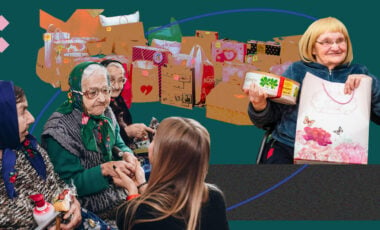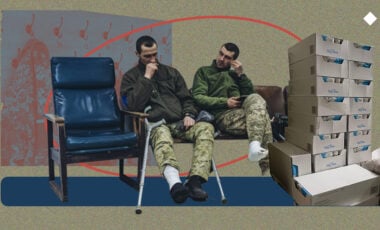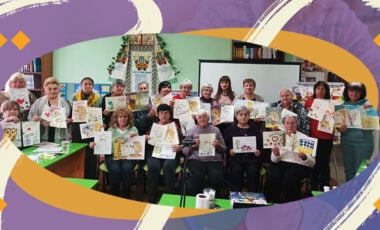Rubryka introduces a "branded" format: what is changing
For almost two years now, the all-Ukrainian online media Rubryka has been developing solutions journalism in Ukraine. Now Rubryka will make the format of articles even clearer: we will sort it all out!

At Rubryka, we talk not only about problems but also about solutions. How change is happening, how Ukraine is developing, what the world has to offer, and how each of us can use it to improve our lives and the lives of our communities. That is why we are developing such a direction as solution journalism in Ukraine. And we're just gaining momentum!
WHAT IS THE PROBLEM?
We want to make our articles even more convenient and even more useful for our readers. Unscrambling everything so that everyone who reads the article can get a ready-made solution to their problem, from the experience that we, the experts and the heroes of our articles, the creators of solutions and change, will tell you about.
"We value the time of our readers and want to present articles in the most concentrated form, in clear navigation. Although interviews, reports, special projects will also continue to appear, most often you will see the format in which we lay out the topic according to a single structure on our website," says the founder and editor-in-chief of Rubryka, Anastasia Rudenko.
The editors want to show that effective solutions are everywhere. In public life, environmental protection, in the promotion of women's rights and inclusion, in politics and culture.
That is why Rubryka introduces a new format of solution articles. You'll recognize them from a thousand. And now let's explain why.
WHAT IS THE SOLUTION?
The new format of the Rubryka articles envisages, first, a certain structure so that answers aren't lost in the text.
So, in the articles, you will see the following blocks:
What is the problem?
Here we will talk about where any solution begins, the problem. What made caring people look for a solution? Climate change, problems with social inclusion, discrimination against minorities, bad roads, or the lack of a public park in a residential area: whatever it was, this was the first impetus for finding a solution. You may have encountered it too.
What is the solution?
Here we will talk about how a specific person/organization/community/etc. solved this problem. As solution journalism tells us, this solution must already be in action, not just in theory, that is, it must already be in place. And of course, we will talk about who became the creator of the solution, and who implements it in reality because we need a hero!
How does it work?
Solution journalism differs from "success stories" in that it analyzes how a solution works. Here we will tell about the mechanics of the solution. How was it implemented in reality? What did the heroes face? What methods were used? What insights did they get? This is something that will show others why the solution worked and how it can be implemented. This is the unit that will help others do the same, not just inspire. That is, it is a useful element: specific advice, life hacks, which follow only from practice.
We won't ignore the limitations, obstacles, and pitfalls of each solution. We'll outline everything that prevented the implementation of the solution; what problems the hero faced on the way to the implementation of the plan; what and where went wrong; what was not possible and why?
In "How does it work?" we will tell everything: the good, the bad, the ugly.
Does it really work?
Effectiveness is important. In this block, we will prove that the proposed solution really works. What has already been achieved? What exactly is the improvement? We'll tell you everything!
Even more useful solutions
One solution is good, and many are even better! Here we talk about how such problems are solved by other people; what international experience is; what each of us can do right now to help a good cause, for example, sign a petition or something else. Also here we will tell what the plans for the future of our heroes are, how they plan to develop their solutions, and what will happen next. Instructions, checklists, links to additional articles, crowdfunding, and voting, you can find it all here.
To make it convenient for readers to read text from any device and store important information quickly and efficiently, we include bullet lists and quotes from experts in our articles that can easily fit even the size of a telephone screen. Screenshots have never been so attractive!
Moreover, both editorial and partner articles will be created in the new format.
"We live in a world that is moving at breakneck speed. It is a world of busy people and a huge continuous flow of information. Our task is to give you useful content that you have time to read without breaking away from your coffee during the break. And the new format will allow maximum which is a big plus for both us and our advertisers. After all, better involvement in the content = better effectiveness of native advertising," says the commercial director of Rubryka, Anastasia Kurylenko.
DOES IT REALLY WORK?
Yes! The new format of Rubryka is convenient and really allows you to make it loud and simple. You can see for yourself:
For example, here we talk about how Romani women are helped to get to their feet in Odesa.
Here, about what to do with old gadgets and how their recycling works in Ukraine.
And here, about how Dnipro activists turned an abandoned location into a recreation spot.
EVEN MORE USEFUL SOLUTIONS!
The format is important, but the main thing is what lies inside each of our articles. Stories of solutions and their creators. Solution journalism helps us to uncover them, focusing on specific cases, stories of specific people, groups, communities. What is the peculiarity of this approach, where did it first appear, and why is it gaining momentum right now? Read in our article "Where to look for a solution? What solutions journalism means, and why it's about Rubryka."
📣 If you want to offer your solution, write to us at team@rubryka.com





















































